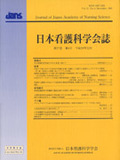Japanese
English
- 販売していません
- Abstract 文献概要
- 参考文献 Reference
- サイト内被引用 Cited by
要旨
目的:日本のターミナルケアの中に内在する臨床に即した看護の倫理的価値観を帰納的に抽出・記述することを目的に本研究を行った.
方法:ターミナルケアの経験を有する看護師32名を対象に非構成インタビューを行い,Bennerらによる解釈学的現象学の手法を用いてその逐語録の分析を行った.
結果:ターミナルケアにおける看護師の倫理的価値観は,それぞれの場面で看護師が大事にしているあるいは気にかけている「関心」として表された.抽出された倫理的関心は,①患者を傷つけない,②誠実,③隔絶・孤独の解消,④その人らしさを尊重する,⑤患者の希望を尊重する,⑥安楽,苦痛からの解放,⑦患者が有意義なあるいはよい時間を過ごすの7つであった.
結論:これらの倫理的関心は日本の看護に内在する倫理的価値であり,生命倫理における倫理原則と共通する部分もあるが,文化的意味や動機づけなど異なる部分もあった.
Abstract
Purpose: The purpose of this study was to explore and delineate the Japanese nurses' ethical values residing in their end-of-life care practice.
Method: Thirty-two nurses with end-of-life care experiences were interviewed. The transcripts from the interviews were analyzed using hermeneutics approach developed by Benner et al.
Findings: Seven ethical concerns were emerged as Japanese nurses' ethical values in end-of-life care: 1) not hurting the patient; 2) honesty; 3) concerns for isolation/loneliness; 4) regard for the patient's personhood; 5) respect for the patient's wishes; 6) comfort/relief from suffering; and 7) meaningful and pleasant time for the patient.
Conclusion: These concerns embody the ethical values among Japanese nurses and are partly different from Western ethical principles in its meanings and reasoning.
Copyright © 2007, Japan Academy of Nursing Science. All rights reserved.


